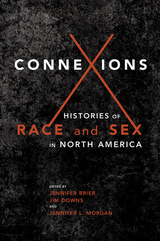4 books about Stein, Marc

Bicentennial
A Revolutionary History of the 1970s
Marc Stein
University of Chicago Press
As the United States marks its semiquincentennial in 2026, renowned historian Marc Stein looks back at the politics of another landmark celebration during a time of striking similarities and surprising differences: the US bicentennial in 1976.
In the aftermath of Vietnam and Watergate, the bicentennial sparked an extraordinary national conversation about the country’s past, present, and future. As patriots, planners, profiteers, and protesters argued about how to commemorate the national birthday, they collectively reimagined the promises and perils of democracy during a transformational decade.
From award-winning historian Marc Stein, Bicentennial: A Revolutionary History of the 1970s is an original, illuminating, and insightful study of that era. While focusing on festivities and fights in the nation’s birthplace, Philadelphia, the book also explores the many proposed and abandoned celebrations that percolated up around the country, situating the bicentennial in local and national contexts. It tells a broadly democratic story of both the “official” bicentennial and counter-bicentennial activism, offering revolutionary perspectives on national politics, social movements, and popular culture. From the queer courtship of US President Richard Nixon and Philadelphia Mayor Frank Rizzo to parades and protests with millions of participants, and from a deadly outbreak of Legionnaires’ disease in Philadelphia’s most prestigious hotel to the establishment of groundbreaking African American, ethnic, and Jewish museums, the bicentennial reveals a kaleidoscope of American peculiarities, problems, and possibilities.
The lasting influence of 1976 on one of the nation’s great urban centers and the United States as a whole is undeniable. As the nation—once again enmeshed in political and social upheaval—celebrates its two-hundred-fiftieth birthday in 2026, there is no better time to look back at its two-hundredth and marvel at what has changed, and what has not.
In the aftermath of Vietnam and Watergate, the bicentennial sparked an extraordinary national conversation about the country’s past, present, and future. As patriots, planners, profiteers, and protesters argued about how to commemorate the national birthday, they collectively reimagined the promises and perils of democracy during a transformational decade.
From award-winning historian Marc Stein, Bicentennial: A Revolutionary History of the 1970s is an original, illuminating, and insightful study of that era. While focusing on festivities and fights in the nation’s birthplace, Philadelphia, the book also explores the many proposed and abandoned celebrations that percolated up around the country, situating the bicentennial in local and national contexts. It tells a broadly democratic story of both the “official” bicentennial and counter-bicentennial activism, offering revolutionary perspectives on national politics, social movements, and popular culture. From the queer courtship of US President Richard Nixon and Philadelphia Mayor Frank Rizzo to parades and protests with millions of participants, and from a deadly outbreak of Legionnaires’ disease in Philadelphia’s most prestigious hotel to the establishment of groundbreaking African American, ethnic, and Jewish museums, the bicentennial reveals a kaleidoscope of American peculiarities, problems, and possibilities.
The lasting influence of 1976 on one of the nation’s great urban centers and the United States as a whole is undeniable. As the nation—once again enmeshed in political and social upheaval—celebrates its two-hundred-fiftieth birthday in 2026, there is no better time to look back at its two-hundredth and marvel at what has changed, and what has not.
[more]

City Of Sisterly And Brotherly Loves
Lesbian And Gay Philadelphia, 1945-1972
Marc Stein
Temple University Press, 2004
Marc Stein's City of Sisterly and Brotherly Loves is refreshing for at least two reasons: it centers on a city that is not generally associated with a vibrant gay and lesbian culture, and it shows that a community was forming long before the Stonewall rebellion. In this lively and well received book, Marc Stein brings to life the neighborhood bars and clubs where people gathered and the political issues that rallied the community. He reminds us that Philadelphians were leaders in the national gay and lesbian movement and, in doing so, suggests that New York and San Francisco have for too long obscured the contributions of other cities to gay culture.
[more]

City of Sisterly and Brotherly Loves
Lesbian and Gay Philadelphia, 1945-1972
Marc Stein
University of Chicago Press, 2000
In this pathbreaking history, Marc Stein takes an in-depth look at Philadelphia from the 1940s to the 1970s. What he finds is a city of vibrant gay and lesbian households, neighborhoods, commercial establishments, public cultures, and political groups. In doing so, Stein shatters the myth that lesbian and gay history began with the 1969 Stonewall riots in New York City and challenges the notion that only New York and San Francisco featured major lesbian and gay communities in the pre-Stonewall era.
Stein takes us on a tour through Philadelphia's bars, restaurants, bookstores, bathhouses, movie theaters, parks, and parades where lesbian and gay cultures thrived.
We learn about the scientific experts, religious leaders, public officials, and journalists who attacked and ignored same-sex sexualities. And we read about the courageous people who fought back with strategies of everyday resistance and organized political activism.
Stein argues against the idea that a conspiracy of silence surrounded gays and lesbians in the 1940s and 1950s. He shows that same-sex sexualities were regularly discussed in controversies concerning the tennis player Big Bill Tilden, the Walt Whitman Bridge, sex murders and crimes, and police raids. Philadelphians became national leaders in the gay and lesbian movement. They conducted sit-ins at Dewey's restaurant, organized pickets at Independence Hall, edited the movement's most widely circulated publications the Ladder and Drum, and pursued court cases all the way to the U.S. Supreme Court.
Beautifully crafted and exceptionally well-written, Stein's book not only provides a new starting place for thinking about lesbian and gay history but also challenges readers to rethink twentieth-century urban history.
Stein takes us on a tour through Philadelphia's bars, restaurants, bookstores, bathhouses, movie theaters, parks, and parades where lesbian and gay cultures thrived.
We learn about the scientific experts, religious leaders, public officials, and journalists who attacked and ignored same-sex sexualities. And we read about the courageous people who fought back with strategies of everyday resistance and organized political activism.
Stein argues against the idea that a conspiracy of silence surrounded gays and lesbians in the 1940s and 1950s. He shows that same-sex sexualities were regularly discussed in controversies concerning the tennis player Big Bill Tilden, the Walt Whitman Bridge, sex murders and crimes, and police raids. Philadelphians became national leaders in the gay and lesbian movement. They conducted sit-ins at Dewey's restaurant, organized pickets at Independence Hall, edited the movement's most widely circulated publications the Ladder and Drum, and pursued court cases all the way to the U.S. Supreme Court.
Beautifully crafted and exceptionally well-written, Stein's book not only provides a new starting place for thinking about lesbian and gay history but also challenges readers to rethink twentieth-century urban history.
[more]

Connexions
Histories of Race and Sex in North America
Edited by Jennifer Brier, Jim Downs, and Jennifer L. Morgan
University of Illinois Press, 2016
Connexions investigates the ways in which race and sex intersect, overlap, and inform each other in United States history. An expert team of editors curates thought-provoking articles that explore how to view the American past through the lens of race and sexuality studies. Chapters range from the prerevolutionary era to today to grapple with an array of captivating issues: how descriptions of bodies shaped colonial Americans' understandings of race and sex; same-sex sexual desire and violence within slavery; whiteness in gay and lesbian history; college women's agitation against heterosexual norms in the 1940s and 1950s; the ways society used sexualized bodies to sculpt ideas of race and racial beauty; how Mexican silent film icon Ramon Navarro masked his homosexuality with his racial identity; and sexual representation in mid-twentieth-century black print pop culture. The result is both an enlightening foray into ignored areas and an elucidation of new perspectives that challenge us to reevaluate what we "know" of our own history. Contributors: Sharon Block, Susan K. Cahn, Stephanie M. H. Camp, J. B. Carter, Ernesto Chávez, Brian Connolly, Jim Downs, Marisa J. Fuentes, Leisa D. Meyer, Wanda S. Pillow, Marc Stein, and Deborah Gray White.
[more]
READERS
Browse our collection.
PUBLISHERS
See BiblioVault's publisher services.
STUDENT SERVICES
Files for college accessibility offices.
UChicago Accessibility Resources
home | accessibility | search | about | contact us
BiblioVault ® 2001 - 2025
The University of Chicago Press









